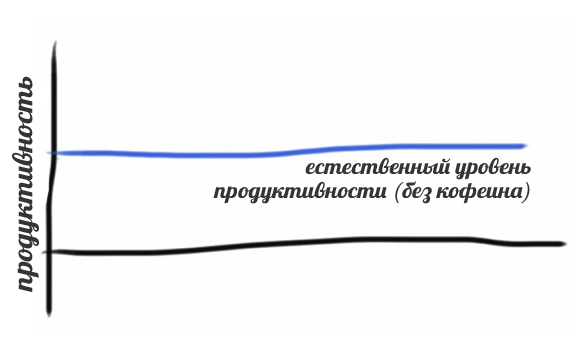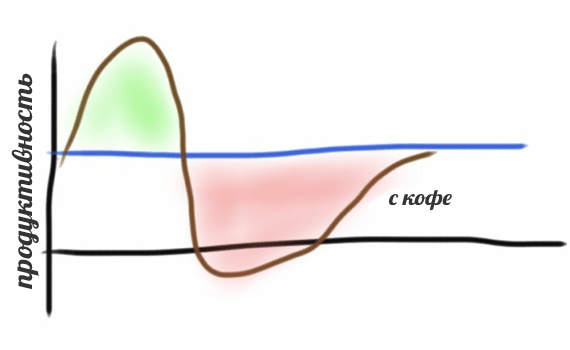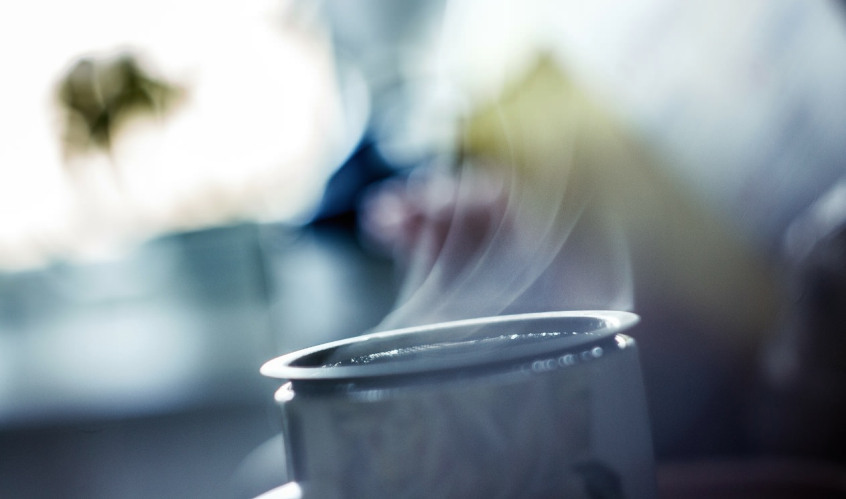How to get maximum energy from caffeine

We continue to acquaint you with the translations of Chris Bailey's articles, where he shares the tips that he learned during the “a Year of Productivity” project . We have previously published articles by this author, they are available in our blog in the "personal productivity" section . We want to remind you that the common goal of all articles is to share the author’s experience of how to become more successful and effective everywhere: in your personal life, relationships with friends, yourself, and of course at work (whatever you do)!
So we give the word to Chris!
')
Last week, I looked at 70 hours of TED talks as part of an experiment to improve personal efficiency , during which I found out how caffeine affects my ability to learn.
To assess the effect of caffeine on my learning, I mainly watched how it affects my attentiveness and energy.
What I understood by experimenting with coffee and tea
Last week I experimented mainly with green and black tea. I usually drink one or two cups of green tea a day and one or two cups of coffee a week.
A cup of green tea contains 25 mg of caffeine, a cup of black tea contains 42 mg, and a cup of brewed coffee contains 108 mg of caffeine. It turns out that coffee has the highest power charge among these drinks. If you want to get the maximum energy, you should drink coffee, as it is most effective in this regard (unless, of course, energy drinks that are deliberately not included in the list are counted, as they are simply stuffed with sugar, which negatively affects health, although there are pleasant exceptions among them).
In order to understand exactly how caffeine affects my attentiveness and energy, I began by excluding it completely from my diet for two days.
I think that each person has an individual level of productivity (meaning the natural level of productivity without any stimulants). There is nothing tricky about the “level” of productivity shown below — it’s just a curve reflecting the effect of caffeine.

After drinking a caffeinated beverage, the effect comes immediately. Caffeine rapidly begins to affect the central nervous system of a person, reduces physical fatigue and restores concentration. As a rule, caffeine helps to focus and improves coordination. All this, of course, affects productivity. Take, for example, tea:

Of course, artificially high figures should sooner or later decline. At the moment when caffeine begins to wash out of your body, a certain “caffeine crisis” arises. The crisis that you feel from green tea (if you feel it at all) is much weaker than from coffee, but it is still present, at least for me. In the case of green tea, the loss of productivity due to the crisis is minimal (light red area) compared to the energy that you received as a result of its use (green area). This means that drinking green tea to increase productivity is fully justified. From my point of view, the same can be said about black tea.
With coffee, things are very different. Coffee, of course, stimulates more, it is more pleasant to drink, it provokes an explosion of productivity (if you have not abused it and have not earned "caffeine jade"). But again, everything that has gone up must go down, and for me the unpleasant consequences of drinking coffee are more than advantages.

The amount of caffeine in coffee is much higher than my usual dose (four times as I usually drink green tea), and since my body is not accustomed to a lot of caffeine, its use, ultimately, greatly reduced my productivity. I think that everyone who consumed caffeine more than usual came across something similar.
In fact, there are two things that I would like to explain through these graphs:
- If you do not abuse caffeine, you will receive a powerful boost of energy and increase your attentiveness.
- This charge of energy will have its price - you can lose a share of your productivity when caffeine stops working (this share is directly dependent on the amount of caffeine you drink).
Caffeine can significantly affect your productivity if you drink it too much or have no idea of the serious negative effect that caffeine has to wash out from the body on your vitality, motivation and attentiveness. But, fortunately, last week I found ways to reduce these negative effects.

Six ways to get the most out of caffeine
Caffeine can significantly affect your productivity. The list below can certainly be supplemented (I’m sure there are tactics I’ve missed), but these 6 ways have helped me maximize the positive effects of caffeine and minimize the “crisis” coming later.
- Drink coffee / tea should be for a long period of time so that the body is gradually accustomed to the flow of caffeine. Do not immediately "bomb" his shock doses. If you gradually get used to caffeine, your body will learn how to gradually "wash out" it, and you will not be acutely aware of "crises."
- If you drink coffee in the morning, drink water too. By maintaining the water balance, you can maintain concentration. In addition, in the morning, when your body lacks fluid (after 8 hours of sleep), nothing quenches thirst better than water. During my experiment, I found out that drinking water in parallel with coffee helps me to concentrate. It should be noted that numerous studies have shown that caffeine does not lead to dehydration.
- Stay away from sugar-containing energy drinks. Such drinks, of course, stimulate them and are pleasant to drink, but they contain a huge amount of sugar, which will necessarily affect the level of insulin, making the subsequent “crisis” more tangible. I know that there are a number of exceptions, even among these tonic agents, but what stands on the shelves of the stores is, by and large, garbage.
- During the adaptation of your body to caffeine, try to eat well. When I ate slowly digestible food (for example, whole grains, vegetables and fruits), I noticed that I save energy longer and do not feel the “crises” so acutely.
- Do not drink caffeine on an empty stomach. Drinking coffee on an empty stomach means stimulating the production of hydrochloric acid, which is not very good, since hydrochloric acid should be produced exclusively for the breakdown of food. Subsequently, your body will digest food more slowly, which will lead to the formation of excess weight.
- Wait a while before drinking a second cup of coffee / tea. Usually, after drinking a cup of coffee / tea, I immediately pulls a second drink. The point is probably that I seek to get a double dose of energy. Pausing between two cups of coffee / tea, I stretch the resulting positive effect in time, which increases my productivity.
Most people prefer to notice only advantages in caffeine. It helps to concentrate, gives energy and makes you feel great. But caffeine also has a negative short-term effect on your productivity. It is expressed in the form of over-stimulation (caffeine “jitters”) and so-called “crises” (that is, following a surge in energy, prostration, motivation and concentration).
Understanding the many-sided effects of caffeine on productivity and taking the necessary measures to reduce undesirable effects, you can increase the level of your concentration, motivation and energy for the whole day.
PS Some time ago we published one of the most interesting articles from Chris Bailey - Why great achievements will not make you happier (and what to do about it!) .
Translated by Vyacheslav Davidenko, founder of MBA Consult
Source: https://habr.com/ru/post/283972/
All Articles